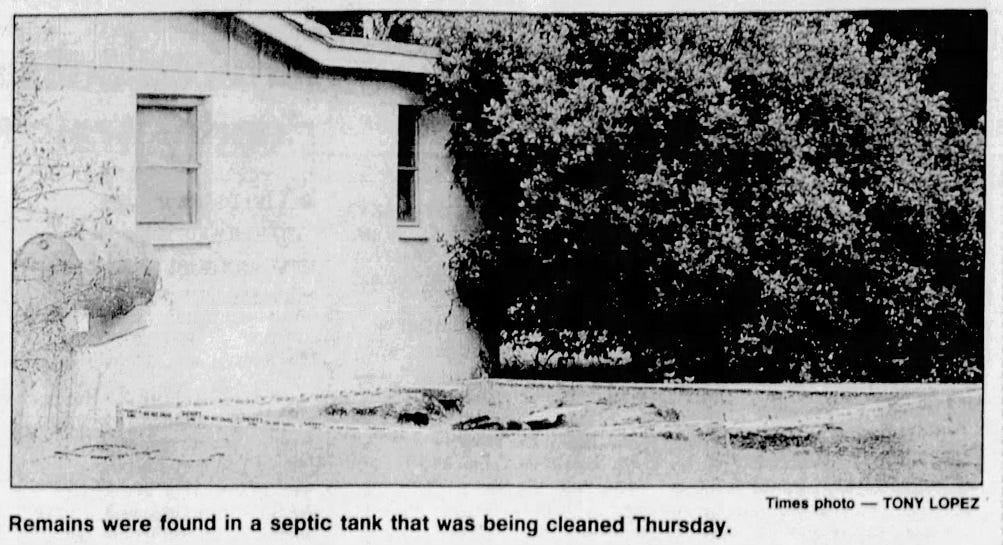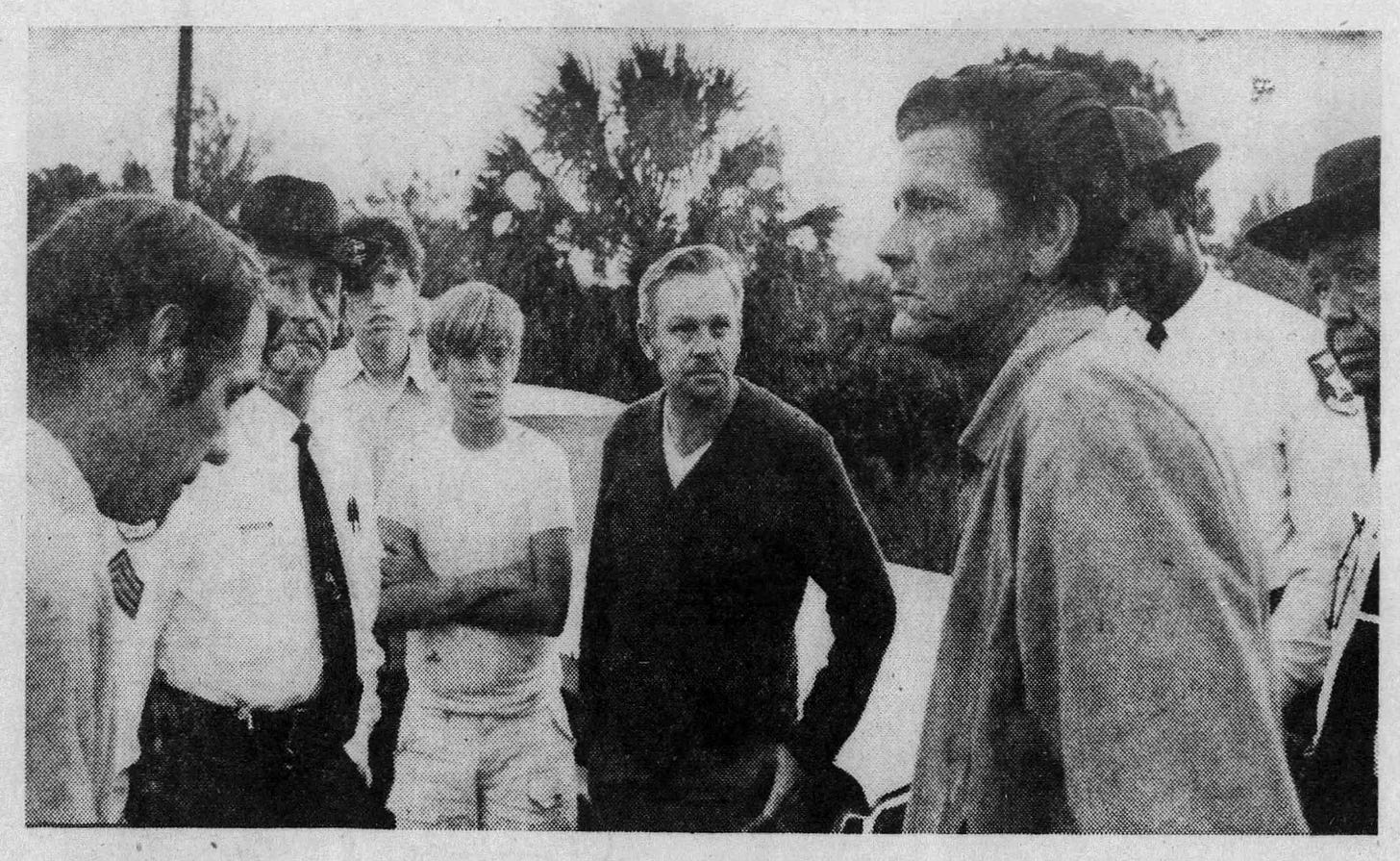In the Unlikeliest Place
On December 31, 1992, a septic tank company rolled into the property of a home that sat vacant for two years. Reinaldo Ramon Paiz who owned it for decades died in 1990, and his daughter was selling it
The real estate agent advised her to pump the tank in order to make it more attractive to potential buyers since it had not been serviced in at least twenty years, around 1972. Or at least that’s what they thought.
Timothy Scanlon, 19, with Ted’s Tanks found the septic tank lid had once been broken through, and then covered with dirt and a piece of glass. This puzzled him as it appeared the tank had not been pumped before. He continued with his work, possibly thinking of plans for New Year’s Eve. Then his eyes were drawn to a round object stuck in the waste of two decades. It looked like a coconut, and perhaps he never wondered how something of that size ended up there.
He adjusted the hose that extended to the truck and started to pump, then the process hiccuped and he knew there was a clog. He unscrewed the hose from the septic tank opening, and saw the obstruction was human bones, but even with unpracticed eyes, he could see they belonged to a child. There were legs bones, pelvic, ribs, jawbone and a deceptive-looking small, brown skull.
Timothy immediately called his father, the owner of the company, who sped over to look at what his son had found. Among the remains was a child’s cowboy boot. The next call was to the police.
The remaining contents of the septic tank were painstakingly screened by the police, and more bones, another boot, a flashlight and clothing tags were recovered. There was no doubt the child’s remains were hidden here as it was impossible for him to have fallen in.
There were some on the police force who were familiar with an address across the street, and a case that had gone cold almost twenty years before. It was the disappearance of 3-year-old Matthew Alred.
On January 13, 1993, the death of the boy was ruled a homicide by undetermined means. There were no indication of injuries that could be found on the bones, but the fact the body was hidden so effectively pointed to a murder.
DNA tests could not be completed, however the size of the bones and the little brown boots were testament that this indeed is where Matthew Alred rested for so many years. The boots were something he was known to wear from morning to night.
Matthew disappeared a little after 5 PM on Sunday, January 27, 1974. By then the sun was setting, his parent thought he was playing in the yard with his older siblings, ages 12, 7 and 5, and it turned out they were mistaken. Somewhere in the gloom of twilight, Matthew walked out of his yard and into oblivion.
Scores of volunteers and police searched for him that night and the days to come. They ranged around the scrubs and palmettos, checking ponds, and anywhere a small child could have fallen into.
Two days after Matthew's disappearance there were hints of "late information" in the local newspapers that led the police department to believe "there are some indications of foul play." The FBI joined the search; on the chance the child had been abducted.
According to The Tampa Times, “sheriff's lieutenant Arnie Myers said today (Jan. 29) information from area residents and other clues indicated some other than the child just wandering away. This does not mean we believe the child is dead, and in fact just the opposite. We just believe foul play is indicated." He didn't clarify what he meant by foul play.
On Wednesday, January 30, the FBI suspended the search into the child's disappearance. Many thought that Matthew had been abducted, especially after a spokesman denied reports that the Hillsborough Sheriff's Department had information the child had been killed.
In February 1974, the search was officially over, but police still followed up leads coming in from the Southeastern United States. Matthew's parent believed he had been abducted. Virginia Alred said, "I believe he's been abducted by somebody that wanted a child to love".
Vernon Alred told reporters he doubted his son's abduction was a "spur of the moment" incident, and that whoever took Matt might possibly be living in the Clair-Mel area. His wife agreed and added, "Perhaps it is a mother's intuition, but I've thought it might be somebody that lives around here. I wish I had the authority to make a house-to-house search, you wonder what people got in the next room."
By June 1974, the story had faded from the newspapers.

Across the street from the Alreds lived Reinaldo Paiz, 57, who worked as a waiter and lived at the house with his wife Mary. His children were grown and married. Only four months before one of his sons had wed, and sadly in 1971, another 30-year-old son died in a car accident. The Paiz were known as nice neighbors who let the kids on the block play on their property, and even allowed little Matthew to ride their pony.
Matthew’s father, Vernon spoke well of them when interviewed by a local newspaper four days after his son went missing.
Months and years sped by, and the Alreds held out the hope that one day their son would return searching for his real family.
But time also erased those that could provide answers. If alive and questioned, would Reinaldo Paiz tell the story of what happened to Matt Alred on that winter night? Was there an accident, or more unforgivable, was it an act of cold-blooded murder? His wife Mary died in 1983; did she have any inkling that a child’s body was secreted in the septic tank of her home while she comforted his mother?
Unknown to Mrs. Alred, she was pregnant with a son. She gave birth in October, 1974. The family moved to Connecticut to escape the horror of those days, however the pair eventually divorced. Vernon Alred moved back to the area. The home they lived in during those years was razed, and another structure was built there in 2001.
On January 16, 1993, Matthew’s memorial service was held. Despite answering the most pressing question, which was what happened to Matt Alred, there were others just as important that most likely will remain unresolved. They are why and who.
Vernon Alred passed away in 2003.








